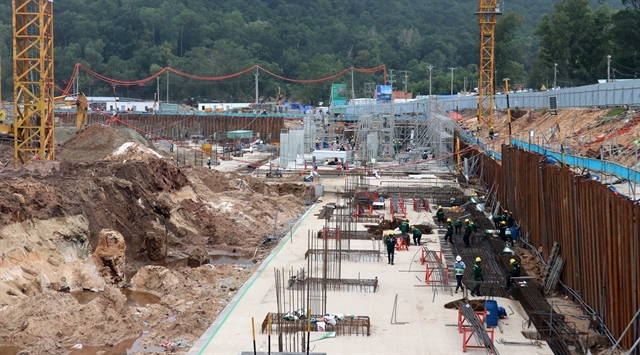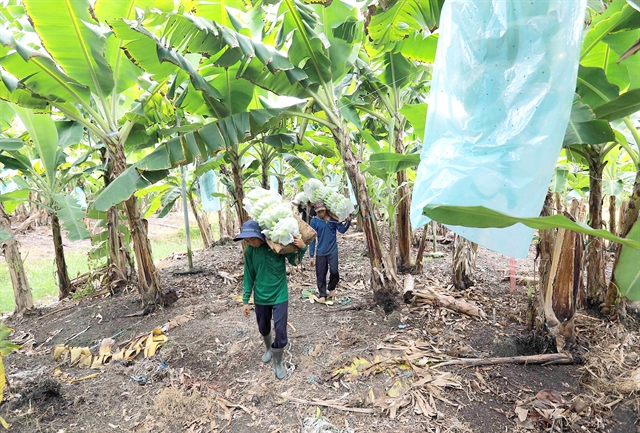 Society
Society

Long An Province is increasing the use of high-tech agriculture to improve production efficiency.

|
| A farm in Long An Province's Đức Huệ District grows bananas for processing for export. – VNA/VNS Photo Vũ Sinh |
LONG AN — Long An Province is increasing the use of high-tech agriculture to improve production efficiency.
By 2025, the Cửu Long (Mekong) Delta province plans to use advanced farming techniques on 6,000ha of dragon fruit, 60,000ha of rice, 2,000ha of vegetables, 3,000ha of lime, and 100ha of brackish water shrimp, according to Nguyễn Thanh Truyền, director of its Department of Agriculture and Rural Development.
The province is focusing on implementing its programme for high-tech agriculture, combined with agricultural restructuring, Truyền said.
This includes using advanced farming techniques and machinery, reducing the quantity of rice seed used for sowing, and increasing the use of organic fertilisers.
The southern province is investing in infrastructure for agriculture, forestry, and fisheries, and is prioritising investment in high-tech farming and concentrated farming areas to better adapt to climate change.
It is boosting advocacy activities to raise public awareness of its high-tech agriculture programme, focusing on 2021-25.
Long An Province is also developing farming areas for export, helping co-operatives and co-operative groups establish linkages among stakeholders for producing and selling their produce. It is working on implementing digital transformation in high-tech agriculture and investing in infrastructure projects for high-tech agricultural zones.
Last year, the province spent VNĐ244 billion (US$9.6 million) on 40 infrastructure projects to support agricultural production and build new-style rural areas.
Currently, there are 50,300ha of rice, nearly 2,000ha of vegetables, 4,900ha of dragon fruit, 2,900ha of lime, and 45ha of shrimp using high-tech farming methods in the province.
More and more farmers in the province are adopting high-tech farming methods because they increase yield, quality, and efficiency.
Nguyễn Văn Hảo, a farmer who has been growing vegetables for nearly 20 years in Cần Giuộc District's Phước Hậu Commune, cultivates 1ha of vegetables, including 0.5ha in a net house. In 2018, he spent more than VNĐ130 million ($5,100) to build the net house and install automatic irrigation facilities.
“Vegetables grown in the net house develop well, suffer from fewer pests and diseases, and require fewer plant protection chemicals,” he said. Now, he earns a profit of VNĐ250 million ($9,800) a year.
The province has provided farmers with high-tech farming techniques to grow vegetables, fruits and livestock, supported the development of value chains for agricultural produce, and helped co-operatives and co-operative groups improve their operational capacity.
The Việt Safe Vegetable Co-operative in Cần Đước District's Long Trạch Commune is one of the province's co-operatives chosen by local authorities to apply technology.
Its members cultivate more than ten types of vegetables, primarily leafy greens and coriander, and sell 300kg of them a day to supermarkets in HCM City and neighbouring provinces.
Nguyễn Thị Lan, the co-operative's director, said they had been growing high-tech vegetables on 7ha for six years and encouraged their members to expand farming areas.
Attracting Investment
Long An is prioritising attracting investment in two large agriculture projects this year.
One is an 855-ha high-tech agriculture zone in Tân Hưng District's Hưng Điền Commune to grow rice, corn, banana and other fruits, and other high-quality, high-yield crops.
The other is a 1,400-ha high-tech agriculture zone in Thủ Thừa District's Tân Thành Commune that will focus on developing the agricultural economy.
The province aims to achieve a 2-2.5 per cent agricultural growth rate this year.
To meet the target, Long An Province People’s Committee has ordered relevant departments and local authorities to focus on implementing various measures, including achieving an annual rice output of 2.85 million tonnes, with high-quality rice accounting for more than 70 per cent.
The Department of Agriculture and Rural Development, in cooperation with local authorities, will encourage farmers to vaccinate livestock and poultry and guide them in breeding shrimp according to recommended schedules and techniques.
This year, the province is expected to have low rainfall and a water shortage for irrigation during the dry season, the risk of disease outbreaks among plants and animals, technical barriers to trade in imported markets, and declining prices for some agricultural products.
The People’s Committee has directed the department to implement measures to mitigate the impacts of saltwater intrusion in the dry season and manage saltwater prevention works to store freshwater for irrigation and household use. — VNS




